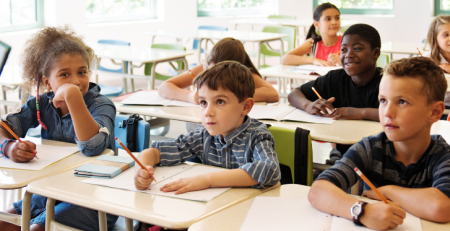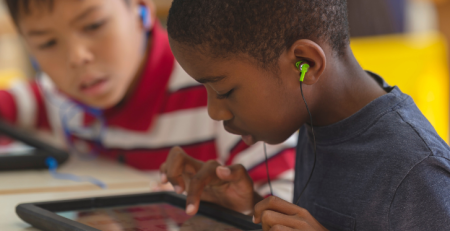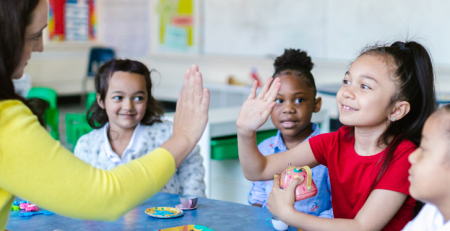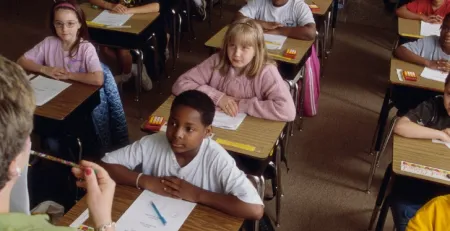A School Psychologist’s Guide to Restoring Developmental Milestones
Rebecca Ragland is an Assessment Consultant in our Education division at MHS. As an experienced school psychologist with a background in public education, she shares her knowledge of how other school psychologists can better support students and their families in the upcoming school year. We talk about disruptions in youth developmental milestones in the post-pandemic era and how building relationships with students and understanding their individual needs is key to establishing foundational skills for learning and development.
The interview below has been edited for length and clarity.
What is your background in school psychology and what areas did you focus on?
REBECCA: I’ve spent the last 20 years in education and have been a Nationally Certified School Psychologist for the last 17 years. I worked within the public school system in both Texas and Washington state. My experience as a school psychologist includes all age and grade levels, from early childhood through transition programs. I have served as a District Autism Evaluation Team Lead. Like most school psychologists across the U.S., most years, my role was heavy on evaluations and supporting Individualized Education Plan (IEP) development.
I find that the most rewarding part of being a school psychologist is the opportunity to collaborate and consult with parents and teachers to support student progress and development.
What are some examples of developmental milestones in youth that were disrupted due to restrictions during the pandemic?
REBECCA: Given our shared but differing experiences across the U.S. during the pandemic, this is a great question. In my state, schools were closed much longer than in other areas of the country. For example, COVID-19 precautions remained in the South for a much shorter period of time.
Across the board, we see that many milestones have been disrupted, leading to delays and an increased need for intervention. The biggest disruptions have impacted social interactions, engagement, and behavior regulation skills. All grade levels are experiencing these difficulties. Opportunities for youth to take risks and to experience physical exploration of space have been disrupted, both important precursors in development. In early childhood and early elementary grades, many children demonstrate delays in areas such as toileting, language development, fine and gross motor skills, and academic readiness and achievement. Parents report being more cautious with their children, and as a result, they spend less time developing, practicing, and demonstrating independence in these areas.
How can school psychologists move forward to help restore or measure progress in some of these critical stages of development?
REBECCA: Here’s some ways school psychologists can approach this issue:
- One critical way school psychologists can help in this area is to continue to provide information and “re-training” on developmental milestones and to interpret the milestones as delays versus a disorder. While there seems to be a desire and a push to get back to pre-pandemic expectations and norms in education, the trauma and stress experienced by many families should be explored. School psychologists can help articulate those needs to school teams when considering the next steps in supporting students.
- Another way that school psychologists can advocate and help students is by encouraging multi-tiered systems of support, designed to address the whole child. Effective and comprehensive assessment, when warranted, should focus on a strengths-based approach to draw on the student’s strengths and opportunities for growth and progress.
- School psychologists should also advocate for students to engage in activities and experiences that help build connections and motivation for their learning. Many districts are concerned about the level of apathy demonstrated by students post-pandemic. Some low-cost ways of providing these opportunities for engagement include playing interactive board games, visiting the local library, tapping into creative activities, including art and music, and allowing for exploration of environments, including time outside, unstructured play, and opportunities to engage with peers.
Joanna Solomon, Manager of Psychometrics and Data at MHS, contributed to an excellent article on updates on the changes in development milestones for children from the Centers for Disease Control and Prevention (CDC). This update includes changes to the definition of “average” on developmental checklists. This updated information is helpful in discussions with families.
Why is it important for school psychologists to advocate for parents and teachers to reinstate routines, set boundaries, and set clear expectations for youth in the post-pandemic era?
REBECCA: Simply put, we know that routines, boundaries, and expectations are essential for development! Creating routines, setting boundaries, and having clear expectations provide predictability and a sense of control, and they help establish a safe learning environment. Establishing predictability and consistency is critical for teachers to teach and for students to learn. Setting boundaries at home helps support essential routines for basic needs, such as sleep and healthy eating, technology, and screen time.
How can school psychologists engage with students and families in understanding how their at-home dynamics have changed to better understand their needs?
REBECCA: I recommend asking questions and giving students and families space and time to share their experiences, including changes and disruptions in their at-home dynamics. Creating a partnership with parents and demonstrating a genuine desire to understand what a family is experiencing builds trust and confidence that all parties are there to support the child’s progress and development.
School psychologists can also play a role in helping parents understand community and school resources. Early intervention before kindergarten is critical; however, we know that getting that intervention can often prove difficult. Many children have missed yearly pediatric visits where developmental milestones are observed and discussed. Those families seeking additional medical or psychological evaluation and therapies for their children often experience long wait times in many communities. It is essential to encourage parents to seek support through their local school system and medical providers.
What advice do you have for school psychologists when it comes to student-teacher relationships that meet the specific needs of each student?
REBECCA: I am a big believer in unconditional positive regard. In other words, taking time to support, understand and show empathy and modeling these behaviors for others. Very little happens, especially in times of difficulty, without some form of a relationship in place. Advocating for unconditional positive regard allows teachers and staff to build confidence, predict better outcomes, and better understand student needs. Making positive connections and relationships and demonstrating and teaching empathy helps students feel safe and less judged and creates a stronger classroom community.
How do MHS’ assessments help streamline the process of identifying students’ specific needs, planning for intervention, and monitoring their progress over time?
REBECCA: MHS provides a comprehensive collection of assessments to address a wide range of emotional, behavioral, attention, and social problems. Our collection of assessments allows practitioners to address the co-occurring needs of a student with complementary measures. These assessments are used through the evaluation and intervention process, including progress monitoring. While initial identification of a need is important, developing an appropriate intervention plan and progress monitoring is critical. Using norm-referenced standardized tools to assess students’ needs empowers school psychologists to interpret reliable insights and support students in reaching their potential.
Learn more about MHS’ collection of youth assessments for school psychologists.
Have questions? Get in touch with a member of our team.










